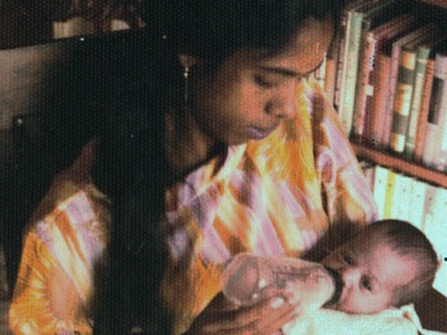How Kamala Harris’ Mother Inspired Her Run For President - Page 2

In this undated photo provided by the Kamala Harris campaign in April 2019, Shyamala Gopalan Harris, 25, holds her baby, Kamala. (Kamala Harris campaign via AP)
For two freethinking young people drawn to activism, they landed on campus from opposite sides of the world just as protests exploded around civil rights, the Vietnam War and voting rights. Their paths crossed in those movements, and they fell in love.
At the heart of their activism was a small group of students who met every Sunday to discuss the books of black authors and grassroots activity around the world, from the anti-apartheid Black Consciousness Movement in South Africa to liberation movements in Latin America to the black separatist preaching of Malcolm X in the U.S.
A member of the group, Aubrey Labrie, says the weekly gathering was one in which figures such as Mao Zedong and Fidel Castro were admired, and would later provide some inspiration to the founders of the Black Panther Party. Gopalan was the only one in the group who wasn’t black, but she immersed herself in the issues, Labrie says. She and Harris wowed him with their intellect.
“I was in awe of the knowledge that they seemed to demonstrate,” said Labrie, who grew so close to the family that the senator calls him “Uncle Aubrey.”
The couple married, and Gopalan Harris gave birth to Kamala and then Maya two years later. Even with young children, the duo continued their advocacy.
As a little girl, Harris says she remembers an energetic sea of moving legs and the cacophony of chants as her parents made their way to marches. She writes of her parents being sprayed with police hoses, confronted by Hells Angels and once, with the future senator in a stroller, forced to run to safety when violence broke out.
Sharon McGaffie, a family friend whose mother, Regina Shelton, was a caregiver for the girls, remembers Gopalan Harris speaking to her daughters as if they were adults and exposing them to worlds often walled off to children, whether a civil rights march or a visit to mom’s laboratory or a seminar where the mother was delivering a speech.
“She would take the girls and they would pull out their little backpacks and they would be in that environment,” says McGaffie.
A few years into the marriage, Harris’ parents divorced. The senator gives the pain of the parting only a few words in her biography. Those who are close to her describe her childhood as happy, the smells of her mother’s cooking filling the kitchen and the sound of constant chatter and laughter buffeting the air.
The mother’s influence on her girls grew even greater, and friends of Harris say they see it reflected throughout her life.
As a kindergartner, Stacey Johnson-Batiste remembers Harris coming to her aid when a classroom bully grabbed her craft project and threw it to the floor, which brought retaliation from the boy. He hit the future politician in the head with something that caused enough bleeding to necessitate a hospital visit, cementing for Johnson-Batiste a lifelong friendship with Harris and a view of her as a woman who embodies the ethics of her mother.
“Even back then,” Johnson-Batiste says, “she has always stood up for what she thought was right.”
As a teenager, after her mother got a job that prompted a family move to Montreal, Harris began seeing how she could achieve change in ways small and large. Outside her family’s apartment, she and her sister protested a prohibition against soccer on the building’s lawn, which Harris says resulted in the rule being overturned. As high school wound down, she homed in on a career goal of being a lawyer.
Sophie Maxwell, a former member of the San Francisco Board of Supervisors, says Harris wasn’t choosing to eschew activism but rather to incorporate it into a life in law: “Those two things go hand in hand.”
In college, at the historically black Howard University in Washington, D.C., Shelley Young Thompkins recalls a classmate who was certain of what she wanted to do in life, who was serious about her studies and who put off the fun of joining a sorority until her final year even as she made time for sit-ins and protests. Thompkins and Harris both won student council posts.
In her new friend, Young Thompkins saw a young woman intent on not squandering all that her mother had worked to give her.
“We were these two freshmen girls who want to save the world,” she says.
From there, Harris’ story is much better known: a return to California for law school; a failed first attempt at the bar; jobs in prosecutor’s offices in Oakland and San Francisco; a brazen and successful run at unseating her former boss as district attorney; election as state attorney general and U.S. senator; and her run for president.
Each step of the way, friends point to the influence of Gopalan Harris as a constant.
« Previous page 1 2 3 4 Next page »














